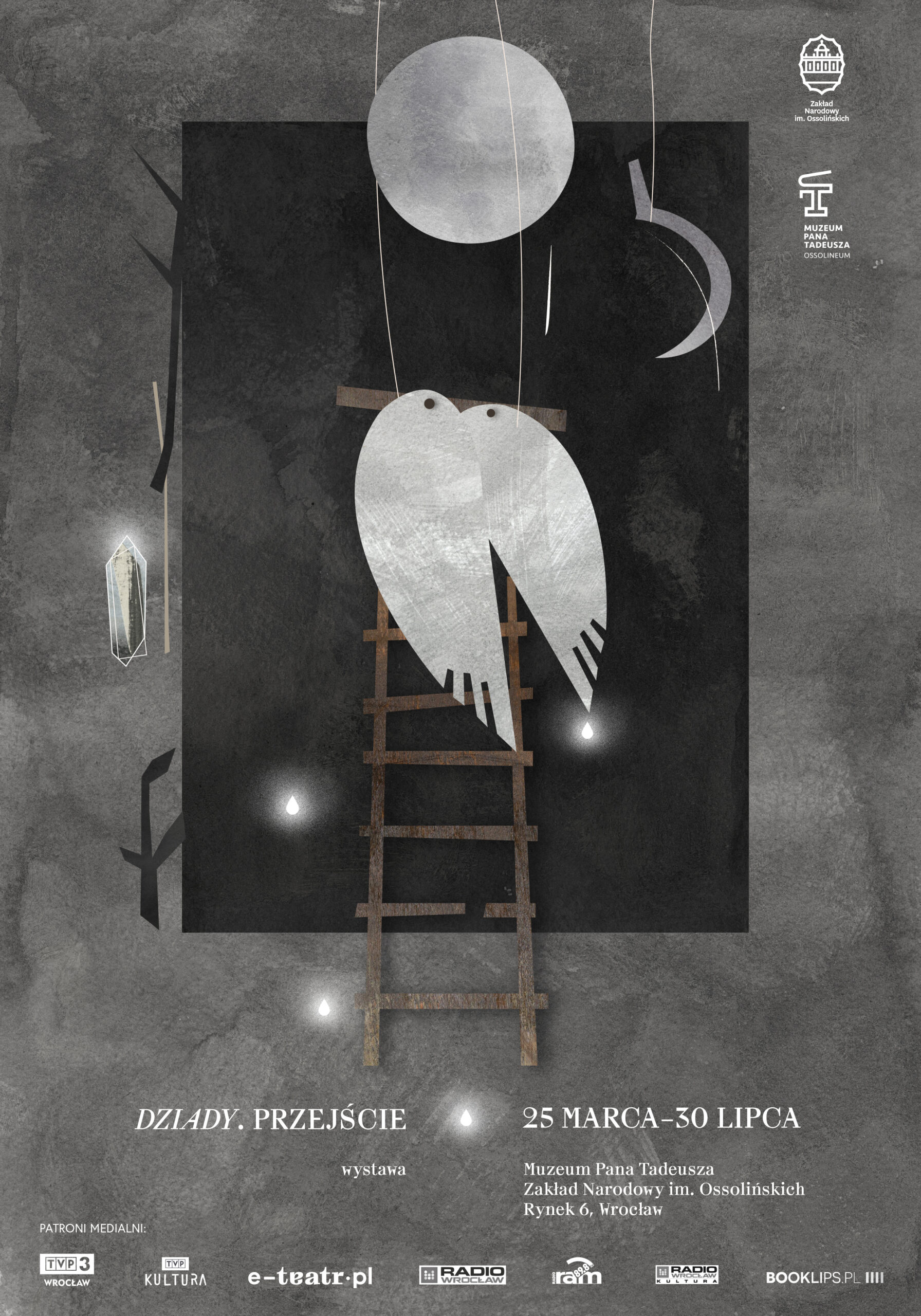temporary exhibition
Dziady. Transition
- 25 March–30 July 2023
- opening: 25 March 2023 at 5.00 PM (free entry)
- exhibition is open to the public from 26 March 2023
- admission included in the museum ticket price
- curatorial team: dr Justyna Kowal, Agnieszka Śrutwa, Paweł Zaręba, dr Joanna Hytrek-Hryciuk
Exhibition Dziady. Transition
The Pan Tadeusz Museum cordially invites you to a temporary exhibition devoted to Adam Mickiewicz’s “Dziady”. The exhibition aims to look at the expansive universe of the work by presenting the enormous ethnographic, literary and theatrical potential inherent in Mickiewicz’s work. The idea behind the exhibition is the political context of the drama, or rather the role of its specific staging – “Dziady” directed by Kazimierz Dejmek and performed at Teatr Narodowy, discontinued in the early 1968, widely considered to be the catalyst for the March Events.
Stanisław Wyspiański, who was the first to attempt to stage the relative entirety of Mickiewicz’s “Dziady”, wrote the following of his staging project: “We will perform at the theatre what we all know, what the whole Polish audience knows by heart”. The words of the author of “Wyzwolenie” indicate the specific way in which the drama functions in Polish culture and its power, which has only intensified since Wyspiański’s time.
A walk through the museum exhibition is an encounter with unique objects from the Ossolineum’s collections and with several selected themes of “Dziady”: starting with the purely textual matter, the circumstances in which the individual parts were created, to a broad look at the ritualistic character of the work and the motif of the clash between good and evil. An extremely important sphere of the exhibition is the issue of staging the drama and the accompanying belief in its romantic ‘non-stageable’ nature. In his famous “Lecture XVI”, Mickewicz spoke of the “two distinct layers” of Slavic drama: “writing” and “staging”: “Drama needs to be set on the ground: it needs a theatre building, actors, all kinds of arts. In drama, poetry transitions into action towards the audience”. This ‘transition’ leads to visualisation of staging strategies chosen by the greatest theatre-makers taking up Mickiewicz’s text. Theatrical interpretations of the drama will come to life in the exhibition space thanks to a range of authentic sources and documents, staging props and costumes, photographs, recorded excerpts, memoirs and commentaries – starting from Stanisław Wyspiański’s concept, to stagings by Leon Schiller, Jerzy Grotowski, Kazimierz Dejmek, Konrad Swinarski, Jerzy Grzegorzewski, to Wrocław performances by Kazimierz Braun, Monika Strzępka and Paweł Demirski. Particular attention will be given to the unabbreviated “Dziady” project by Michał Zadara (Teatr Polski in Wrocław). The materials, gathered in the “Powidoki” room, show the complex and multi-level creative process that resulted in the over-10h-long performance - Celebration of the Dead and Celebration of Theatre at the same time.
The finale of the exhibition addresses the problem of the political “activation of tardy spirits”, the myth of the causal power of “Dziady”. The cumulation of multi-level conflicts, laconically referred to as March ‘68, represents a transition from stage drama to social drama. This process is illustrated with the story of an individual – the biography of a mathematician and lecturer at the University of Wrocław, Stanisław Hartman, who was removed from teaching as a result of the anti-Semitic campaign. The wide-ranging context of the events of 1968, which changed the face of Europe forever, is also illustrated with photographs relating to the invasion of Czechoslovakia by Warsaw Pact troops and with comments from the foreign press.
Apart from exhibits from the collections of the National Ossoliński Institute, the exhibition features objects on loan from Narodowy Stary Teatr im. Heleny Modrzejewskiej in Kraków, the Silesian Museum in Katowice, Zbigniew Raszewski Theatre Institute in Warsaw, Wrocławski Teatr Współczesny im. Marii i Edmunda Wiercińskich, Polish Theatre in Wrocław and from the private collection of Professor Magdalena Raszewska. We will also present archive documents on the social protests in response to the events of March ‘68. These include archive materials of the former Security Service stored at the Institute of National Remembrance, documents from the Archives of the University of Wrocław, photographic material from Polish Television, the Depot History Centre and the Polish Press Agency.
Exhibition team
- project coordinator: Agnieszka Śrutwa
- curatorial team: dr Justyna Kowal, Agnieszka Śrutwa, Paweł Zaręba, dr Joanna Hytrek-Hryciuk
- arrangement and visual identification: Adriana Myśliwiec
- conceptual cooperation: Maria Jeziorowska, Małgorzata Orzeł, Teresa Sokół, Magdalena Sozańska
- production: Joanna Poślednia and Technical Department team
- multimedia: Marta Krakowiak, Michał Pawlik, Marcin Kafel
- conservation: Katarzyna Kroczak, Urszula Wencka, Aleksandra Kuklewska, Marta Drawc and Department of Conservation team
- cooperation in the selection and preparation of objects from The Ossoliński National Institute: Department of Art, Early Imprints Department, Social Life Documents Department, Book Storage and Circulation Department

